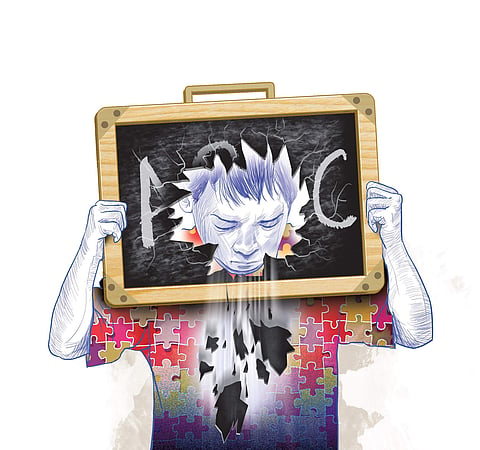

While the lockdown due to the COVID-19 pandemic has thrown life out of order for people across the globe, it is especially difficult for those with autism. Children and adults with autism need to have routine and structure to be able to make sense of life.
"Children with autism cannot understand ambiguity. It's always black and white. It can never be a probability or uncertainty. Their sense of each day is based on the activities they perform on that day," says Vidya, mother of 15-year-old Vishal Anand.
"During this lockdown, everything is ambiguous - there's no school, there's uncertainty about everything for them. My son Vishal was supposed to give his class X NIOS exams. He has writing difficulty, so we chose the scribe option. But, now, the exams are postponed. We explained it to him and he knows that the exams are not happening, but the uncertainty about when it will happen again, whether his scribe will come, these questions trouble his mind. Also, there's hardly any information on the news about exams for special school children," she says.
Vishal is an autistic savant. Autistic savants are those with autism who also have a single extraordinary area of knowledge or ability. So even though he knows and understands that the exams are postponed, his unanswered questions cause a great deal of anxiety. "He needs to see it on the news, because my younger son who goes to a CBSE curriculum school gets all the circulars on the news. Why is the lockdown not considered a challenge for special children? Why are they not talking about special schools," Vidya asks.
Another challenge is for parents to keep them occupied and maintain a routine during this period. Vidya has arranged a lot of Skype lessons for Vishal. They include his music lessons and video chats with his tutor. "We also have our routine poojas at home. Somehow, I'm trying to show him that there is a sense of normalcy even now," she adds.
Talking about being indoors for extended periods, she says, "Special children need to spend time out in the open, more than others. My son loves cycling. Now, not being able to step out has curbed his freedom. Children with autism don't understand that. They think they're being punished. We told him that COVID-19 is a disease that is spreading quickly and people need to stay at home to stop the spread. It took time for him to understand the reality of it, but now, he is able to process all the information. My advice to parents of children with autism would be to keep them in the loop about what is happening. Whether they understand everything or not, ensure that they know that it is not a punishment, it is something to protect them and others. Inclusion starts right there. Let them have a role in discussing it too."
